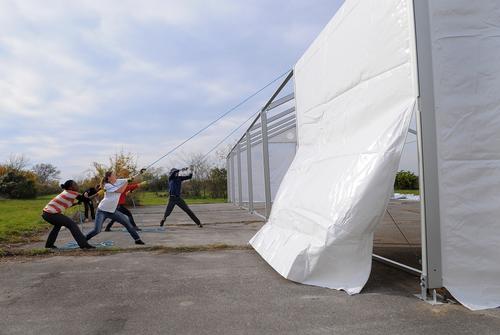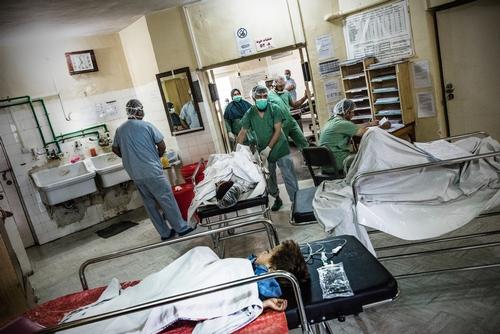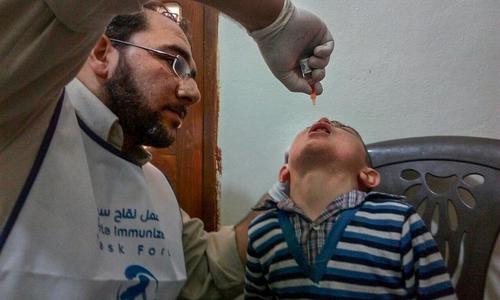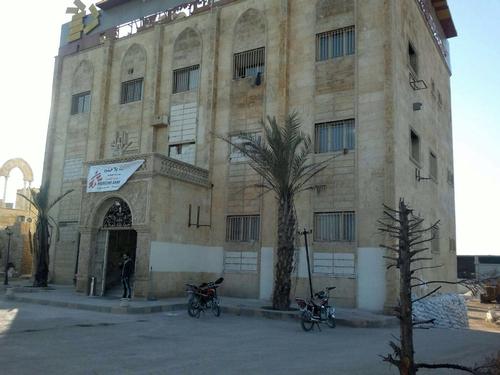Every year, thousands of people fleeing violence, insecurity, and persecution at home attempt a treacherous journey via North Africa and across the Mediterranean to reach Europe. And every year, countless lives are lost on these journeys.
In 2015, European policies led to a dramatic worsening the refugee crisis
2015 will be remembered as the year in which Europe catastrophically failed in its responsibility to respond to the urgent need for assistance and protection of over a million men, women and children. Not only did the European Union and European governments collectively fail to address the urgent humanitarian and medical needs of refugees and migrants arriving at external and internal EU borders, but their policies and actions actively contributed to the worsening of the so-called “refugee crisis” and the health and well being of those who fled.
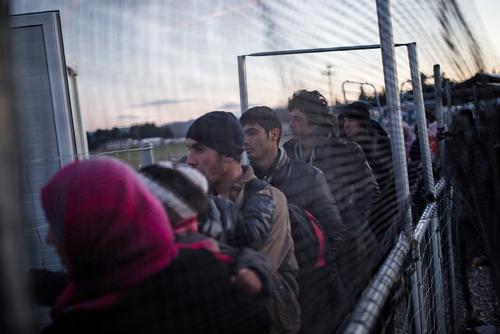
Europe’s restrictive policies put some of the world’s most vulnerable people in more danger, causing more suffering, as they risk it all to try to bring themselves, and their families, to safety. European countries (and transit countries) have the responsibility to ensure their policies guarantee the right to seek asylum and respect fundamental rights and human dignity.
People will continue to risk their lives at the hands of smugglers as long as there are no safe alternatives
There are very few safe channels that people can take to reach protection, safety and a better life. With Europe’s land borders sealed, people are forced into the hands of smugglers and into leaky, overcrowded boats on the Mediterranean and Aegean seas.
As of 20 February, 94,269 people had arrived in Greece from Turkey by sea this year; this brings the total number of arrivals to the Greek islands since 1 January 2015 to more than 950,000. The daily average of nearly 2,000 arrivals is nearly ten times the daily average of a year ago. The Aegean Sea has become the most deadly route for people trying to reach Greece from Turkey. To date, more than 400 people were reported death in the Mediterranean Sea.
Search and rescue is not a solution to the situation.
Safe and legal alternatives are, but resources must be sufficiently allocated to mitigate for more unnecessary loss of life
In the last six months of 2015, we have seen an increase of vessels contributing to search and rescue efforts in the Central Mediterranean (mainly through FRONTEX, EUNAVFOR). Combined with the decrease of the arrivals in the Central Mediterranean, this led to an improvement in the assistance of boats in distress. This also led to MSF to decide to put an end to its last Search and Rescue vessel still at sea, the Argos on 31 December 2015.
It remains European states’ responsibility and imperative to maintain and provide adequate and proactive resources to rescue lives at sea. We very much hope these resources will be sufficient next year and that our boats will no longer be needed. For this, the creation of a dedicated mechanism to ensure adequate search and rescue capacity in the Mediterranean, with the primary remit to save lives, is essential. In the coming months, the situation may rapidly change and number of arrivals will certainly increase again.
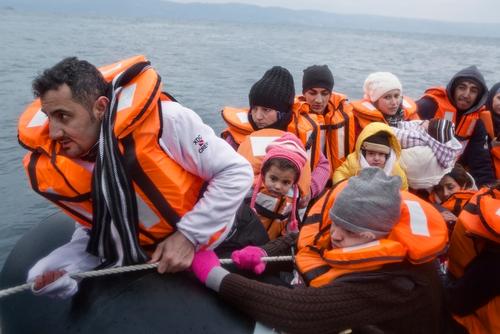
The EU must ensure that an adequate search and rescue capacity is assured when the numbers rise. Moreover, the focus of European policies on targeting smugglers, who remain a symptom of the lack of safe and legal channels, should not take precedence over the urgency of providing lifesaving assistance and appropriate humanitarian assistance for those who risk their life in search of safety and a better life.
In the Aegean Sea, MSF has launched rescue activities off the island of Lesvos (also called Lesbos) in collaboration with the international organization Greenpeace. But its resources are not sufficient and further rescue operations should be put in place in the Aegean, where the number of people crossing from Turkey to Greece remains very high (nearly 2,000 people a day) and where winter and conditions at sea are making this trip more dangerous every day.
The announcement on 11 February that NATO would patrol the Aegean Sea to intercept refugee and migrant boats is another worrying indication of the military focus of the European response, which is not adequate to address the assistance and protection needs of those fleeing for their lives.
The humanitarian consequences of border closures
Rash decisions to close borders and a lack of coordination between different European states have created incredible stress and dangerous conditions for thousands of people on the move. MSF has documented the domino effect of border closure: each time a border closes, thousands of people are abruptly halted, stranded in no man’s lands, with little to no humanitarian assistance, and ultimately, forced onto more dangerous routes or into the hands of smugglers.
Authorizing transit across the Balkans had so far been the only realistic response to the failure of the European asylum system and Greece’s inability to offer assistance and protection. These sudden policy changes, implemented without any consideration of people’s protection, medical or shelter needs, shows once again the incapacity of European and Western Balkans States to provide coherent and humane solutions to the needs of desperate people in search of protection. Everyone has the right to seek asylum, and refugee status and protection needs cannot be judged based on nationality alone.
Contrary to what governments claim, the construction of fences at the EU’s external borders over the past years has not lead to a decrease in the number of people trying to cross and seek protection in the European Union: it has only pushed people to take more risks by crossing the sea instead of safer land borders and has forced them to resort to a thriving smuggling business. As reception places and access to asylum procedures in Greece, the main country of entry, remain largely insufficient and below standards, recent announcements of further border closure along the Balkan route – potentially ring-fencing tens of thousands of people in Greece – are of great concern to MSF. There is potentially a deeper humanitarian crisis in the making.
European countries are only accepting a small share of the total number of displaced
Most of the world’s displaced people live elsewhere in their home countries or in the counties surrounding their home countries, relatively few are granted asylum elsewhere. For example, twelve million Syrians have been displaced by the ongoing conflict. Eight million have fled to other parts of Syria. Four million live as refugees in the countries that surround Syria – many of these countries are now overwhelmed (one in four people living in Lebanon are now Syrian refugees). Only a million people have made it to Europe – that is less than 2% of the total number of European population. It is more than time for European countries to adopt more humane and asylum policies.
Externalized border controls in transit countries and countries of origin cannot be the EU's solution to the European refugee crisis
The enforcement of migration cooperation deals between the EU and its member states with third countries is resulting in unacceptable humanitarian consequences, including high levels of violence and a sustained erosion of refugee and asylum law. The EU can no longer turn a blind eye to the well documented abusesSee for e.g. From a Rock to a Hard Place - highlighting the needs of migrants and refugees in Tunisia (fleeing Libya 2011) and Trapped at the Gates of Europe (Morocco 2013) which includes MSF data showing that more than half of the medical problems diagnosed among 10,500 sick and wounded migrants treated by MSF between 2010 and 2012, were diseases closely related to poor living conditions. In the same period, 18% of MSF’s medical consultations were related to physical and sexual violence. MSF treated almost 700 male and female survivors of sexual violence, attacked in their country of origin, en route and in Morocco. In 2012 alone, MSF teams in Nador, neighbouring Melilla and Oujda assisted more than 1,100 people with violence related injuries, many perpetrated by Moroccan Security Forces and the Spanish Guardia Civil. A 2012 MSF survey found 63% of people interviewed experienced violence in Morocco, with 92% stating that the violence was intentional. MSF teams also recorded worrying increases in the expulsions of vulnerable groups. In 2012, 191 incidents were recorded and more than 6,000 people were expelled, including pregnant women, minors and people requiring medical treatment for violence related injuries. The real numbers are likely to be considerably higher. associated with such externalization of border controls. Unless concrete protection measures to assure equal treatment and the dignity, safety and protection of people on the move are in place, abuses of migrants and refugees will worsen with increased externalization of border control.
Our experience in Morocco and Libya amongst others has shown such policies to have severe medical humanitarian consequences, with people suffering high levels of abuse and ill-treatment.
The urgent need for safe passage
The only way to save life and alleviate the suffering of these people is to provide them with a safe passage through:
- The swift provision of safe and legal channels for people seeking asylum, in particular allowing asylum seekers to apply for asylum at external land borders, including the Evros land border between Turkey and Greece. This also includes making wider use of legal entry schemes, such as for example family reunification, humanitarian visas, simplified visa requirements, resettlement and relocation.
- The creation legal migration pathways to decrease the demand for irregular migration and smuggling networks.
- The creation of an ambitious search and rescue mechanism to save lives at sea. This operation should proactively search for boats in distress as close to departure points as possible and should be accompanied by pre-identified disembarkation points where humane disembarkation procedures, including adequate reception conditions, medical care and vulnerability assessments, are in place.
- Investing in reception according to EU standards instead of deterrence measures only. Europe must move away from a fortress approach to a reception approach designed to address the needs and specific vulnerabilities of people arriving at its borders, in particular their medical and mental health needs.
- In the absence of a functioning common European asylum system, investing more ambitiously in intra-EU relocation schemes and the creation of safe passage through the EU.
- Putting an end to acts of violence and abuse from state authorities
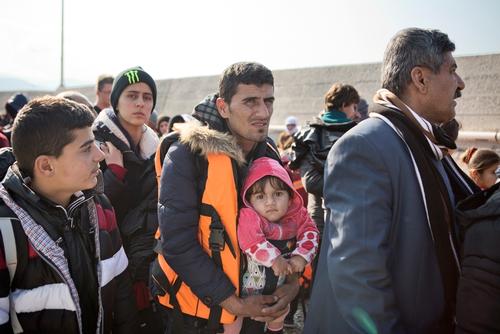
What is MSF doing to help?
MSF has been working with Mediterranean migrants to Europe since the autumn of 2002, when MSF started working in Lampedusa reception centre with a programme that focuses on medical triage of asylum seekers, and has been working with people in many of the countries they flee from for even longer.
Central Mediterranean
In May 2015 MSF took the unprecedented decision to launch search and rescue activities in the Central Mediterranean. By the end of 2015, the Bourbon Argos, the Dignity I and the MY Phoenix had RESCUED 20,129 PEOPLE and assisted an additional 3,000 people. With the decrease in arrivals coming from Libya and the increased SAR capacity in the Central Mediterranean, MSF took the decision to put on standby its operations in the Central Mediterranean in December 2015. It remains ready to intervene should the EU and its member states fail to protect the lives of the thousands of men, women and children expected to flee North Africa for Europe in coming months.
Aegean Sea
With the number of arrivals from Turkey to Greek islands continuing to be extremely high, and the worsening of weather conditions, MSF has launched rescue activities in the Aegean Sea off the island of Lesvos in collaboration with the international organisation Greenpeace.
Between 27 November 2015 and 31 January 2016, the MSF/Greenpeace Rescue operation assisted more than 17,000 people in 335 interventions.
During the same period an estimated 378 people, out of whom 108 were children, were reported dead/missing in the Aegean Sea.
Both in the Aegean and in the Central Mediterranean, sea rescue operations are only a temporary measure to mitigate the loss of lives but they cannot represent a solution. MSF calls on the EU to provide safe and accessible alternatives, for people fleeing war and persecution, to the sea crossing between North Africa and southern Europe which has in the first month of 2016 alone claimed more than 400 lives.
Additionally, MSF operates land-based migration projects in six countries:
TUNISIA
MSF has been working with fishermen in Zarzis, Tunisia, to offer training in search and rescue. Fishermen are often on the first line of the response when boats get into trouble near their fishing grounds and have been given material as well as training to assist them in their efforts. MSF has also provided training to the Tunisian and Libyan Red Crescents in dead body management.
ITALY
In Italy, where sea arrivals are nothing new, the reception system for newly arrived migrants and asylum seekers has been put under great strain. MSF has repeatedly highlighted the shortcomings of Italy's reception system during months of negotiations with the authorities and in a report presented to an Italian parliamentary commission last November.
Sicily: At the end of 2015, MSF ended its medical activities in the reception center of Pozzallo, Sicily, due to the unacceptable conditions including overcrowding and the lack of protection for vulnerable people and the impossibility for our teams to represent an added value inside an inadequate structure. The MSF team there - made up of medical doctors, nurses, psychologists, and cultural mediators - has been supporting the Ragusa Provincial Health Agency with medical screening and a 24-hour medical service, carrying out more than 3,000 consultations since February. During the past year, over 150,000 people have arrived in Italy by sea, and 15,000 of them have landed at the port of Pozzallo.
MSF has also provided mental healthcare support to people living in reception centres in Ragusa province. The team has provided more than 800 consultations for people in need of psychological support, particularly for those suffering from traumatic events. In 2015, in addition to health screenings, MSF provided psychological first aid to people who had suffered traumatic events during the sea journey to Europe, for example those who had experienced shipwrecks. The team - made up of a psychologist and cultural mediators - has been providing psychological first aid in ports of arrival with the aim of alleviating concerns and helping survivors face the first moments immediately after landing. The team has responded to 14 events in eight Italian ports, assisting 2,500 survivors of traumatic events during their sea journey.
Rome: MSF launched in October 2015 a project offering medical rehabilitation to asylum seekers who have been victims of torture, in collaboration with an Italian organization (Medici contro la tortura). The main countries of origin of beneficiaries are Nigeria, Mali, Afghanistan, Ghana, Gambia and Egypt. In total, 39 people from 15 countries have received assistance in more than 340 individual consultations.
Gorizia: In the Northern city of Gorizia, at the border with Slovenia, MSF is providing medical care, shelter and first assistance for the hundreds of refugees. MSF has installed 25 containers, with a capacity to offer shelter to 96 people. Reception facilities have been sufficient to respond to the totality of the local reception needs: all the available places were assigned and there was no further space left for new comers. New arrivals have been regulars but constants through this time, with only one exception, when 15 people passed the border and arrived at the centre during the same day. It is a temporary solution to provide spaces where people can be welcomed with shelter, hygiene facilities and medical screening to improve their living conditions.
During the last month, around 300 medical screenings and visits have been carried out in partnership with the IRC and the local health service. In order to cope with patients’ needs and to provide them with legal information about asylum procedures, MSF has organised trainings with a legal operator and a specialized cultural mediator, in partnership with the national NGO Italian Council for Refugees and legal support office from Caritas.
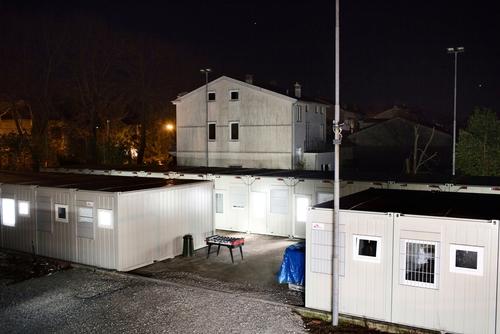
In Udine, MSF is supporting local actors who provide shelter and medical assistance to migrants and asylum seekers. Lastly, MSF is collaborating with local and regional authorities with the aim of smoothing the access to the national health system to asylum seekers and migrants. MSF started a dialogue with the Italian local and regional authorities to find a long term solution and to provide adequate reception to the new arrivals.
GREECE
MSF is providing medical care, shelter, water and sanitation and distributing relief items to refugees and migrants arriving in the Dodecanese Islands as well as on Lesbos and Samos; in Athens; and at the Idomeni border crossing with the Former Yugoslav Republic of Macedonia (FYROM). MSF distributed also several items (heating material, tents, energizing food, winter clothing, and blankets) to volunteer groups in Greece to support their actions for refugees.
In 2015, Greece saw an unprecedented number of arrivals. By the end of the year, 856,723 people in total had arrived into the country and on average, 10 people died every day trying to cross the sea into Europe.
As of 20 February, 94,269 people had arrived in Greece and around 320 people died or went missing trying to reach Europe.
MSF calls on the EU to provide an alternative to the dangerous sea crossing, specifically to create a safe passage at the land border between Turkey and Greece.
On 19 November 2015, new restrictions were implemented only permitting Syrians, Afghanis and Iraqis to cross the border into FYROM, leaving many others stuck in Greece. On 9 December, Greek police banned access to Idomeni Transit Camp for all refugees and migrants that don’t have currently access to winterised facilities and have to wait for long hours in a petrol station in the town of Polycastro. Together with other organisations, MSF called on the authorities to allow migrants and refugees access to the camp - which was subsequently granted on 20 January. The camp is now consistently being used to its full capacity. On 21 February, Afghans - who make up 30 percent of arrivals in Greece - were refused permission to cross both the Greek-FYROM border and the border between FYROM and Serbia.
MSF calls on the Greek authorities to meet their obligations and commit to reception, by providing and managing spaces throughout Greece, where people can access shelter, food, hygiene facilities and medical screening. This is all the more urgent as we have seen that the flow of people arriving is not stopping despite the winter weather and we know that the harsh living conditions could have a severe impact on their health.
Kos, Leros (Dodecanese Islands): There is currently no official reception system in any of the Dodecanese islands, though the construction of a hotspot on Leros is underway and scheduled for completion on 17 February 2016. In addition, the construction of an official reception centre (not a ‘hotspot’ at the Mayors insistence) on Kos is also taking place currently, scheduled for completion by the end of February 2016.
In Kos, MSF has established some tents - to provide extra shelter when the island is full- in the car park of an archaeological park on the island. We are also distributing blankets, water and running a medical clinic which includes access to a psychologist.
In Leros, MSF is providing shelter and hygiene facilities to host the people brought to the island for registration from the neighbouring military island of Farmakonissi, conducting medical activities and distributing NFI’s, food and water. The MSF team has been conducting vulnerability screenings to identify the most vulnerable groups like pregnant women, minors, but also people without any resource to have access to the basic needs, providing medical consultations and mental health support in Leros since March.
Since the beginning of January in Kos and Leros we have conducted a total 569 medical consultations in Kos and 1,252 in Leros. In the first week of February 2016 we have also conducted mental health activities for more than 148 people through individual and group sessions.
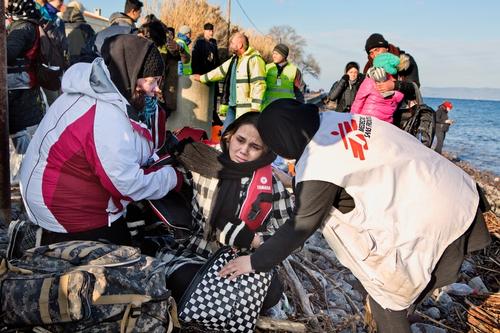
Leros: MSF started Sea Rescue operations in the South East Aegean Sea on 21 December 2015 to provide dedicated rescue support to prevent tragedies at sea, related to the perilous journey refugees have to undertake in order to reach the broader area of the island of Leros and adjacent islands.
Since the beginning of the project the MSF Rescue Teams have assisted more than 500 people trying to reach Farmakonissi and nearby small islets in unseaworthy boats. MSF Leros Sea Rescue project ceased activities from mid-February as more rescue means are in place.
Lesbos: As of 20 February, 53,617 people have arrived to the island of Lesbos – 90% of whom came from Syria, Iraq or Afghanistan. MSF has been responding on the island since June 2015. In the authority-run registration camp (Moria) MSF is providing medical consultations, mental health support, distributing relief items and conducting water and sanitation activities. In the north of the island, MSF is running rescue activities and organising the transportation of new arrivals between the North and the camps in the South where they must complete their registration, in January MSF transported 10,482 new arrivals. In Kara Tepe, the second authority-run camp, MSF is running a medical clinic and operating a mobile medical clinic in the port.
In Mantamados MSF has established a transit camp for arrivals to the north of the island where we provide shelter, medical and mental health activities, a children’s play area and ‘safe space for mothers’ and distribute food, water, blankets. MSF is offering first assistance to new arrivals as they travel down to registration sites in the South of the island.
Our teams - that are providing medical care to refugees and migrants in Kara Tepe and Moria camps and at the port of Mytilini, have observed several pathologies related to the winter conditions, such as respiratory tract infections as well as injuries associated with the journey. MSF continues works to improve water and sanitation in Kara Tepe and Moria camps; ensuring cleaning services throughout the camps, installing chemical toilets and providing water points in Moria. MSF is also offering transportation through 14 buses as well as 2 ambulances to new arrivals, transporting an average of 300 people every day so far in 2016, avoiding them being forced to walk for 70 Km to reach the registration centers in the South of the island. For medical referrals of new arrivals we are operating two ambulances on the island as well as a minivan for mild cases or vulnerable families.
The Greek authorities have yet to identify an additional suitable space to the existing reception center in Moria and Kara Tepe camp where people can be offered shelter, food, hygiene facilities and medical screening. As long as this is not done, in the face of chronic mismanagement by the authorities, it is likely that the island will go from crisis situation to crisis situation. MSF negotiates since months with authorities in order to have a space near the harbour where people wait for their ferry in order to put some heated tents at least for children and vulnerable people.
Idomeni: In Idomeni transit camp, close to the border with FYROM (Former Yugoslav Republic of Macedonia), MSF is running a medical clinic and distributing relief items for those who are continuing their journey to Western Europe. The transit camp now has six heated rub halls, 24 hot showers, wifi, provision for hot food and clean toilets. From 9 December 2015 to 20 January 2016, this camp was closed to refugees and migrants, due to restrictions enforced by the Greek Police, but have since reopened due to ongoing pressure from NGOs and volunteers. The numbers arriving to the north continue to be much higher than the capacity of the transit camp and so, many refugees and migrants travelling to the FYROM border have no option but to spend hours waiting a gas station less than 20km from the camp – often overnight. In response, MSF has established nine 45sqm heated tents at the service station so that people waiting can stay warm and dry. We also run our mobile medical clinic at the site, have set up temporary toilets and distribute food and water.
With 50% of refugees and migrants in Greece now classed as “illegal” – according to Greek authorities - due to expired or illegal papers, it is becoming harder to reach those in need as many have turned to unofficial routes in order to try and continue their journey. In response, we have launched outreach activities in areas we know to be populated by people who have been rejected from FYROM or whom cannot cross. Here, we are providing medical care as well as distributing blankets, food and water. We have seen a considerable increase in smugglers in the area following the restrictions implemented on 19 November only permitting Syrians, Afghans and Iraqi’s to cross out of Greece. In addition, we have consistently heard reports from people who were caught crossing illegally into FYROM and claim to have been beaten by the police – indeed, our medical teams have treated a number of injuries consistent with violent behaviour though we cannot confirm the perpetrators of this violence.
In the last week of January 2016, MSF medical teams conducted 1,462 medical consultations between Idomeni Transit Camp and the Eko Gas Station. The main morbidities are Respiratory tract infections (associated with inadequate shelter) 51% and Gastrointestinal (associated with inadequate access to hygiene facilities) 12%.
Samos: Samos is the second most important island after Lesbos where refugees land when they cross over from Turkey. An MSF team is providing first aid to refugees when they land. Then they transfer them by MSF bus to the city of Vathy where the registration process is taking place in the port area. In Vathy MSF is performing medical and mental health activities at the port where only few nationalities are allowed to be sheltered, mainly Syrians and Iraqis. During weekends, MSF is also running a mobile clinic next to the screening center in the north of Vathy town where the rest of migrants, including Afghans, are waiting for several days/weeks the registration to be completed. MSF is providing NFI and a hot meal to an average of 300 people from the screening center every day. MSF social workers are supporting the referral of vulnerable cases to the hospital and providing translators. MSF started providing a support to local fishermen for research patrols around the island.
Agathonisi: In the island of Agathonisi, close to Samos, MSF team is welcoming new arrivals, providing medical care and shelter to refugees when they land.
Korinthos: In order to provide medical care to the most vulnerable people arriving in Greece, in February, MSF started providing medical care in the Korinthos detention center, where 4,369 people were present. Most of them are coming from Northern Africa and they are stopped in Greece and cannot continue their journey to other European countries. The MSF medical team plans to go to Korinthos twice a week to provide medical consultations in the detention centre.
Athens: In Athens, MSF launched in October 2014 a project offering medical rehabilitation migrants and asylum seekers who have suffered systematic violence in their country of origin, during their journey or in Greece. The MSF team, in cooperation with two local partners: BABEL mental health day center and Greek Council for Refugees, offers medical assistance, including psychiatric care and physiotherapy, psychological, social and legal support aiming at the rehabilitation of victims of violence. 164 people from 33 countries have received assistance in more than 2,500 individual consultations. The project is in the process of being re-launched with increased capacity for outreach in the urban setting in response to the increased needs resulting from the changing context: more and more migrants and refugees spend longer periods in Athens as access to the “Balkans route” is being restricted.
In order to respond to the increase in migrants’ arrivals in Athens, MSF has been providing since December 2015 outpatient medical consultations at the Eleonas Hospitality Centre for Refugees. The medical team consisting of one medical doctor, one nurse, one Arabic translator and one Farsi translator is present every day including weekends. Victoria square in the centre of Athens has become an unofficial meeting place for migrants of all nationalities. On 12 February, MSF started providing outpatient medical consultations in a facility next to Victoria Square, where an NGO welcomes and provides social activities to women and children.
SERBIA
Since late 2014, MSF teams have been present at both entry and exit points in Serbia offering medical services, mental health support and distributing NFIs to people transiting through Serbia, onwards towards Croatia. MSF has also conducted mobile clinics at the Bulgarian border and since January 2016 has re-started activities in Belgrade.
The Western Balkan route is fraught with difficulties and danger. It is subject to frequent and confusing changes as state borders open and close with little warning. Since mid-November 2015 a new policy was introduced in Slovenia that only allows people from Syria, Iraq and Afghanistan to apply for asylum. This policy had a domino effect towards the transit countries which meant that it is now implemented all across the Balkan route. This is a deeply concerning and discriminatory practice since asylum is a universal right based on individual claims and not nationality. This has pushed people back into the hands of the smuggling system, increasing their vulnerability and putting them at further risk. Since this policy was put into place, MSF immediately saw an increase in the number of patients who reported having been victims of violence while crossing Macedonia. These reports have come from Non-Syria, Iraq and Afghanistan country nationals who are forced to cross without papers, therefore denied access to public transport, hostels or medical care. As a result, they are also more vulnerable due to the travel out in the open, at night, in rough terrain and without shelter.
Since January, also Croatia has increased restrictions in the screening of people entering the train (only Syrian, Iraqis and Afghanis), that has led to pushbacks of even documented people – between 100-200 daily. MSF has treated patients who alleged having been beaten by Croatian police while being sent back. Since last year, MSF has seen an increase of women, children and disabled people it has treated and in January 2016 official numbers were: 44%; men; 36% children and 20% women.
Presevo: In Presevo, where the registration center is located, hundreds of people are walking through the border in a dirt road which is often muddy. MSF has set up shelters to protect people from rain and rehabilitated a 1,5 Km road to facilitate the crossing of thousands of people in safer conditions and allow for 4x4 to pick up the most vulnerable. MSF also provides primary health care near the registration center and in a transit camp near the border; supports garbage collection, does NFI distribution, set up toilets and showers and offers transport to vulnerable families and people with disability from the border. MSF also set up seven 45m2 heated tents in waiting areas with capacity for 280 people daily. Since January, MSF teams provide 1,816 consultations in Presevo.
In Presevo, non Syrians, Iraqis and Afghans remain in our tents as they are not allowed inside the registration center and denied services as well. MSF has provided medical care and referred to protection actors for solutions but as there is no option for them unless applying for asylum in Serbia (IOM is not present for voluntary returns). Many have already tried to cross to Croatia having been sent back to Macedonia and entered Serbia again and are now waiting indefinitely or arranging for ways to travel onwards with smugglers.
Sid: In Sid, MSF strengthened its regular medical activities by operating 20/7 inside a transit center where refugees have to wait before going to the train in Sid. MSF has also set up 8 large heated tents with a capacity to shelter more than 2000 people from the cold. Since January, MSF teams provide 4786 consultations in Sid.
Belgrade: With the new policy allowing only certain nationalities to enter in Balkan countries, MSF has seen an increase of the number of people staying again in Belgrade parks, sleeping in the street or at train station with low temperatures and lack of support at night (shelter, food, medical, legal, etc.).
MSF started operating in Belgrade with a mobile clinic during the night, providing primary health care and distributing NFIs. Unaccompanied minors represent 5% of medical consultations in Belgrade (while the proportion is 1% in Presevo, and 0.8% in Sid). In addition MSF has been advocating for shelter and protection solutions for this vulnerable population which often reaches us after having crossed Bulgaria or Macedonia walking for days with no assistance and pray to violence from criminal groups, police and smugglers. This is also a population that often has tried to pass to Croatia and has been denied access on the train or has been pushed back by police. Although MSF has not witnessed these events and can’t identify perpetrators, we have treated cases consistent with the stories told by our patients – coming from Croatia, Bulgaria or Macedonia.
SLOVENIA
MSF is monitoring the situation in Slovenia.
FRANCE
Calais: Around 4,000 refugees and migrants are living in Calais on the so called Jungle site. Calais is the city located near the Channel tunnel linking France and the United Kingdom and for several years migrants have been trying to reach the UK on trucks via the Channel Tunnel. A lot of non-profit organizations and local charitable initiatives are offering assistance to the population of the camp. MSF teams provide around 120 consultations every day in the clinic set up in the camp. These include medical consultations, nursing care, physiotherapy and psychological support. The diseases treated – respiratory and ENT infections and some cases of scabies – are mainly due to the conditions patients are subject to. Tensions are growing between migrants and the police. And we receive now at the Outpatient clinic around three victims of violence every day. Measles cases were reported in the camp and it was decided with the local health authorities to conduct a vaccination campaign for the people older than six months. The target population is estimated at 4,000 people. From 28 January to February 5,2082 people were immunized against measles by different medical actors, including MSF.
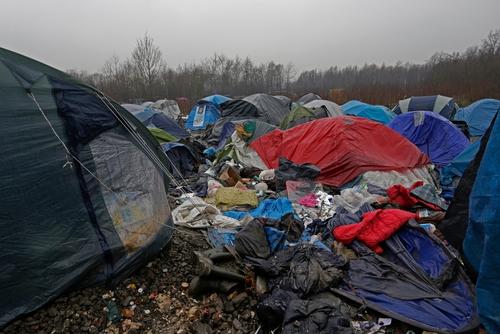
To respond to the need of shelter, MSF started in December building wooden shelter. So far more than 200 have been supplied. MSF did also water and sanitation repair work and set up 66 chemical toilets, as the number of latrines was largely insufficient. To improve the hygiene on the site, MSF set up a system for collecting and managing garbage. On 11 January, the French government opened a camp in a secure area within the camp to provide 1,500 people with accomodation in container-dormitories, not equipped with showers. There 630 people are currently accommodated.
Grande Synthe: Further north of Calais, there is another large site in Grande-Synthe where 2,500 refugees and migrants are living in the mud, wet and cold in appalling conditions. To start with, MSF is providing medical consultations three days a week and has set up 22 latrines and 2 water points. But the main target is to offer this population shelter and more acceptable living conditions. For this purpose, MSF began work on 13 January on a new site for refugees in Grande-Synthe. The project is conducted with the support of the Grande-Synthe’s mayor. The work will take about a month to complete, during which 500 tents (each for 5 people), hot showers and latrines in sufficient number will be installed as well as common living spaces. The new site is planned to be ready end of February. Confirmed measles cases were also reported in the Grande-Synthe camp, and the vaccination campaign is planned for mid-February.



